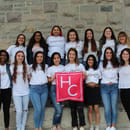The demolition of Palestinian homes by Israel is not a new occurence, though despite the COVID-19 pandemic, it is becoming increasingly common. Home demolition has been a measure used by the Israelis as a form of punishment or retribution against the Palestinians since their occupation of the region in 1967, despite it being a widely condemned action, including by Israeli human rights groups and the United Nations.
The West Bank is split into 3 “areas,” following the agreement made between Israel and the Palestinian Liberation Organization, at the Oslo Accords, signed in 1993. “Area A” is under full Palestinian control, “Area B” is under administrative control by the Palestinians and security control by the Israelis, and “Area C” is under full control by the Israelis, Area C being the largest.
Despite Area C being under control of the Israelis, the occupation of the West Bank is considered to be a violation of the Fourth Geneva Convention, written and ratified after World War II.
The Geneva Conventions are a series of treaties written between 1864 and 1949 in response to war and aimed to improve the after effects of war on civilians and soldiers. The Fourth Geneva Convention states that any occupying force or power “shall not deport or transfer parts of its own civilian population into the territory it occupies.” The demolition of homes is merely one aspect of the Israeli occupation of the West Bank that is seen as a violation of the Fourth Geneva Convention.
These demolitions are often cited as justified because of a lack of building permits held by the Palestinian residents. However, these building permits are practically unobtainable. For example, between 2016 and 2018, only 21 out of 1,485 Palestinian applications for building permits in Area C of the West Bank, were approved. Between 2018 and 2019, only 56 applications were approved, 35 of which were approved in order to relocate Jahalin bedouins, a Palestinian tribe, as part of a state plan which was then never implemented.
Area C is approximately 60% of the occupied territory of the West Bank and stretches up and down the state of Israel. These numbers were only released due to a request made by an Israeli human rights group, known as Bimkom. The Israeli Civil Administration also released numbers indicating more than 2,000 Palestinian homes were demolished in Area C due to a lack of proper papers related to planning and construction of these homes during the same time period.
The Defense Minister to Israel, Naftali Bennett, declared in January of this year, that Area C of the West Bank belongs to Israel and that they are “fighting a real war [on Area C].”
Bennett stated Israel’s new objective was to declare sovereignty over Area C of the West Bank and that he was announcing a new plan to do more than just impose settlements and intensify their actions towards the Palestinians, a plan that supposedly already began a month before the announcement back in January. Bennett aims to completely halt all Palestinian construction in the area within the next two years, effectively aiming to remove them completely from the region.
There are 3 separate categories of demolitions conducted by the Israelis: punitive, administrative and military demolitions.
Punitive demolitions are carried out in retaliation to Palestinian violence against Israelis and are widely condemned and are viewed to be “illegal collective punishment”, even going so far as to being referred to as a form of ethnic cleansing in the region and an apartheid “worse than South Africa,” as stated by former U.S. president Jimmy Carter.
The demolitions are carried out against families with or without ties to violence against Israelis, with no regard for the difference between innocence and guilt and the land is often then used to build Jewish-only settlements. More than 650,000 Jews currently live in over 100 illegal settlements built in the West Bank.
A number of European nations offer moderate aide to Palestinian communities they see as under threat from Israel. However, Palestinian construction in Area C, is viewed as a form of “take over”, a practice which is seen as a grave offense in the eyes of the Israelis.
Jamie McGoldrick, a United Nations humanitarian coordinator for the occupied Palestinian territories, clarified that destruction of proerty within an occupied territory is illegal according to interntional law, unless determined to be “absolutely necessary for military operations.”
While some of the demolitions have been labelled as military “clearing,” punitive demolitions are much more common and are founded in an unfair and restrictive system.
With the current global pandemic now influencing the behavior of nations all over the world, forcing them to address COVID-19 and protect their citizens, other projects or potentially harmful behaviors, such as mass collections of peoples are being minimized or halted altogether.
However, in the months of 2020 considered to be “quarantine” after the pandemic finally reached the U.S., 46 previously inhabited homes were demolished, leaving 299 Palestinians homeless in the midst of a global crisis. That number was reported by Common Dreams, a non-profit organization based in the U.S., back in September, but it is likely to be higher now. The demolitions have left Palestinians vulnerable and exposed not only to the virus but also to continued discrimination and hatred. Settler violence, which includes physical attacks and acts of vandalism against Palestinians is also a continuing issue in the area. The number of COVID-19 cases in the region increased by a full third, reaching 11,077, back in September.
With continuously changing relations in the region, and considering the recent Abraham Accords and the normalization of relations between Israel and two of Palestines regional allies, it’s not difficult to see how heavily impacted the Palestinian population not only in the West Bank, but in general, could be. Palestinian communities in Israel are facing opposition from multiple points and are now in a much more difficult position to protect themselves and their families. They must juggle their health and safety with hostility from others and finding a new home.
Sources: 1 / 2 / 3 / 4 / 5 / 6 / 7 / 8 / 9 / 10 / 11 / 12 / 13 / 14 / 15 / 16 / 17 / 18 / 19 / 20 / 21



